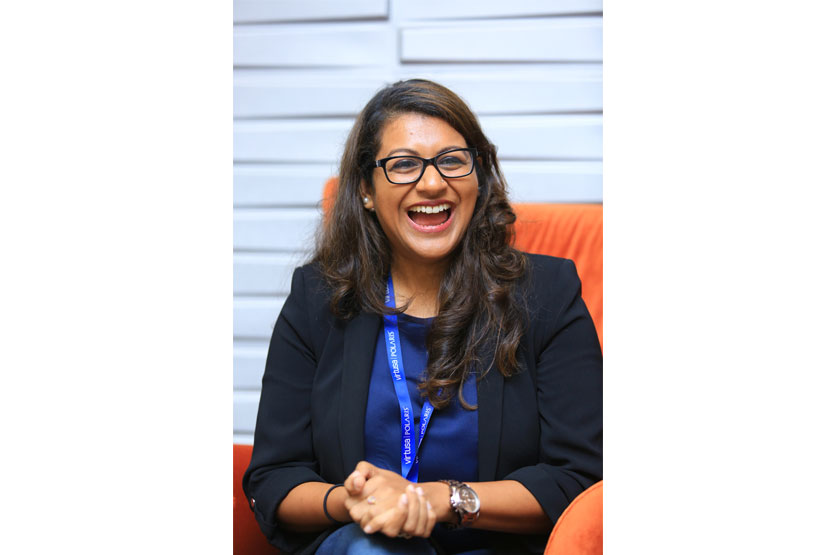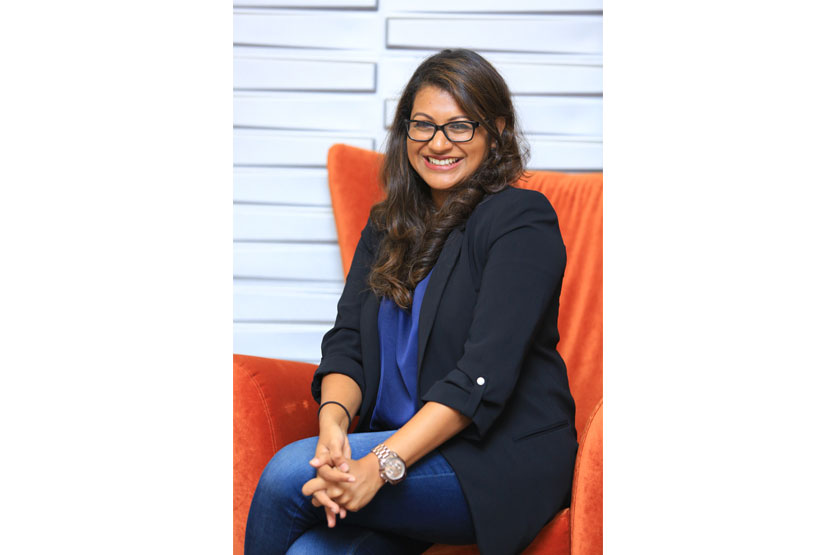Jun 02 2017.
views 2763When Anjali Thalayasingam walked into her first class at the University of Leicester where she completed her degree in Computer Science, there were just 9 other women and around 90 odd men. "It was really interesting because coming from a female dominated environment like Ladies College, suddenly, I saw so little of them in my class" Anjali recounted. "From that point onwards I started realizing that maybe there's something different about us women who got into IT at that time. That kind of ingrained in me the platform that I had to be able to encourage more women to get into IT." And so she persevered, thrived and eventually found her calling.

Anjali reminisces that her love for IT and computers began during her time in school. "I went to Ladies College and I stayed there right throughout from nursery up until my ALs. We had a computer lab - I don't know whether many schools had computer labs back at that time, this was about 15 years ago. I was also part of the magazine committee and I really loved working on the computer. The magazine committee recognized that and they got me to do all the graphics stuff and working with the printers or typing all the articles for the issue that we were supposed to work on for that year and I really started getting fascinated by that. Also the access to the Internet and being able to obtain that kind of information really opened up the world for me."
Following in such an unorthodox career choice at the time - especially for a woman - meant she had to bust out of the norm, especially considering the career choices of her family members.
"My parents are both lawyers and everybody else in my family is either an economist or historian and nobody understood why I wanted to get into Computer Science. But I think it's that early interaction with computers and what they can do that really fascinated me. That's how it all started."
"It was a very techy degree so I had to learn how to code and things I didn't have very much experience in" Anjali explains, adding that it was in college that she discovered her people skills when she was voted course representative for the duration of her degree - being called upon to serve as the voice of the students and having to liaise with faculty. "I would have to have conversations with the faculty on behalf of the students about all the concerns we had. And that's what got me really thinking about the people side of things. I wanted to work in something that had both elements. So I decided to become a Business Analyst. I speak on behalf of the customer, I work with teams; they're technical folk, so I translate the business requirements into understandable techy language and vice versa".

Upon completion of her degree Anjali moved back to Sri Lanka, eventually joining Virtusa Polaris as a Junior Business Analyst and rising within her ranks to solidify her position as the first female segment head at Virtusa. Anjali sees positive strides in terms of representation of women in the IT industry in Sri Lanka.
"I think industry standard is around 27% but here in Virtusa Polaris in Colombo we're at about 33%. So compared to the industry I'm heartened that those gender ratios are changing." But is the IT sector not a highly male dominated one? Anjali agrees, but adds "For me I feel like it's actually a very conducive environment for women because it's so global you don't physically have to be in office to be effective. In my role as a Business Analyst I used to constantly travel all over the place and as long as my boss gives me an objective and I achieve it, I was never questioned as to where I was at any given time. So I believe that the concept of being able to work from anywhere as long as you have connectivity is actually a conducive environment for women."
Incidentally, the theme at Virtusa this year is also very women centric - 'Career Women Empowered'. "About five years ago, Darshana Pai, who's a very senior person at Virtusa based in Hyderabad started an initiative called "Women of Virtusa Polaris" and we had this global theme called 'Energize and Empower'. But what my colleague Chinthi Weerasinghe who was a VP and I decided, was that for this year we want our focus to be career women empowered. We want to make sure that whoever really wants to invest in a career here is empowered in any way. Whether it is work-life balance, whether it's technical skills, whether it's mentoring - that's what we're trying to enable."

Anjali lists adaptability, organizational skills and a good support structure as strengths that are important for women working in the IT industry. "Traditionally in Sri Lanka we have this concept of 9 to 5. You need to recognize that that's not what it's going to be like. It could be 10 to 6. Maybe a few more hours closer to deadlines. You need to be able to adapt accordingly and as required." She also stresses on a good support structure. "Find other like minded people - we have the Women at Virtusa co committee who are there to kind of provide you with support and encouragement and really inspire each other to be better versions of ourselves."
"Stay current" Anjali says, when asked what advice she'd give women looking to delve into the field of IT. "Read up on what the trends are and always keep making sure that you are an expert in something. I have Google alerts set up on IOT, and other trends on IT. I'm constantly reading about what's coming up and looking into the future. This is a really fast moving sector so you can't still be talking about technology that was relevant 10 years ago and be taken seriously in this industry. I think the IT industry may have had a bad reputation when it comes to gender diversity, but I am a testament to not being afraid and I think it's this industry that really propelled me forward." Her advice concludes with the importance of diversity, the strengths that each gender brings to the table. "Diversity leads to better outcomes - innovation, creativity. Different points of view lends to a healthy debate. Companies are now evolving, and people are judged on their performance, not gender".
PHOTOGRAPHS by Damith Wickramasinghe
0 Comments